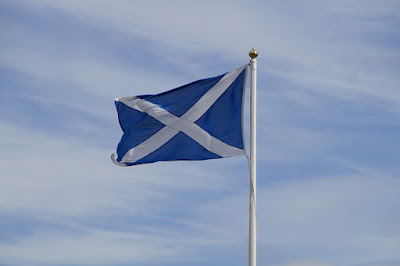As we said HERE, the Celts that inhabited Scotland in ancient times were called Picts. They founded several small kingdoms.
During the 5th century, Scots, a Celtic tribe from Ireland, arrived at the western part of the country and founded the Kingdom of Dal Riata.
Angles were also there, in the southeast part.
How all those folks got united into the Kingdom of Scotland?
Well, in the 8th century, Vikings began raiding the land. That gave an ambitious guy called Kenneth the perfect excuse to fulfill his ambitions: 'Hey, Scots and Picts, how about we all unite in one kingdom, so that we can form a powerful army and kick some Norse ass?'The Picts and Scots were like, 'Yay!'
'There is just one thing that is getting in the way,' Kenneth pointed out. 'We need a king for that.'
The Scots and Picts were like, 'Not so yay.'
'Don't worry, you gooses,' Kenneth chuckled. 'This is where I come into play.'
And so, Kenneth became King Kenneth I.
Over the following centuries, the kingdom expanded all over Scotland.
David I (king from 1124 to 1153) heavily contributed to the Anglicization of Scotland; in the image of England, he established a feudal system and founded a Catholic church. Monkey see, monkey do, huh, David?
However, William the Lion (I don't know whether he was called that because he genuinely had the strength of a lion or he just went by that name on Facebook trying to impress chicks), who reigned from 1165 to 1214, made a critical blunder: In 1173, during a revolt against Henry II of England led by the latter's sons and wife (some family they are!), he helped the rebels.
 |
| Breathtaking view of the Scottish Highlands |
William was captured at the Battle of Alnwick (1174) by Henry's troops. The English monarch was like, 'What you did was not cool at all, dude. Nevertheless, I'm willing to forgive you, on the condition that you swear fealty to me. Furthermore, you will gimme dough for my military expenses and the Church of Scotland will be subjected to that of England. Also, you will give me one blowjob per week.'
And so, the Treaty of Falaise was signed.
15 years later, with Henry's son, King Richard I, needing to raise cash as soon as possible for his participation in the Third Crusade, William managed to buy back the independence of his kingdom. The Quitclaim of Canterbury annulled the Treaty of Falaise.
Even so, the conquest of Scotland remained a permanent wet dream of the English monarchs.
A new opportunity arose in 1286, when Alexander III died and was succeeded by his maternal granddaughter, Margaret, who was 3 years old at that time. The Scottish noblemen appointed six regents called Guardians of Scotland to rule on Little Margo's behalf till she came of age (it is surprising that they bothered with that, considering that a 3 year old can do that job as effectively as an average adult politician usually does it anyway).
However, in an incident that could be another Little Annie joke, Little Margo grew seasick and died while being transported to her new kingdom in 1290.
After that, thirteen fellows claimed the Scottish throne. Some of them had credible arguments as to why they should inherit the kingdom. Others were just carried away by the size of their dick, which made them falsely believe that the whole world belonged to them.
Lest a civil war broke out, the Guardians of Scotland asked King Edward I of England to arbitrate.
Finally, John Balliol, Lord of Galloway, was elected king in 1292. The new king essentially surrendered the country's independence to England.
Soon, though, the Scots revolted and regained their independence a few years later (Declaration of Arbroath, 1320).
Starting from the end of the 14th century, Scotland enjoyed a long period of peace, which was partly due to the fact that the conquest of the land by England had ceased to be every English monarch's wet dream; you see, English kings had now more serious problems to deal with, such as the Hundred Years' War, the Wars of the Roses and the Black Death pandemic (something like the Corona Virus pandemic, except that, as opposed to the latter, the former existed for real!)
Nevertheless, the two kingdoms finally united in 1603, when King James VI of Scotland also inherited the English throne as the last male descendant of the Tudor dynasty, since Queen Elizabeth I had died a virgin badass childless. It was not until 1707 that the union became official, though. But that's another story to be told.
Till next time, don't forget to buy my novels on Amazon (my author page HERE) and advertise my novels and blog posts on social media.
See you next time.

No comments:
Post a Comment